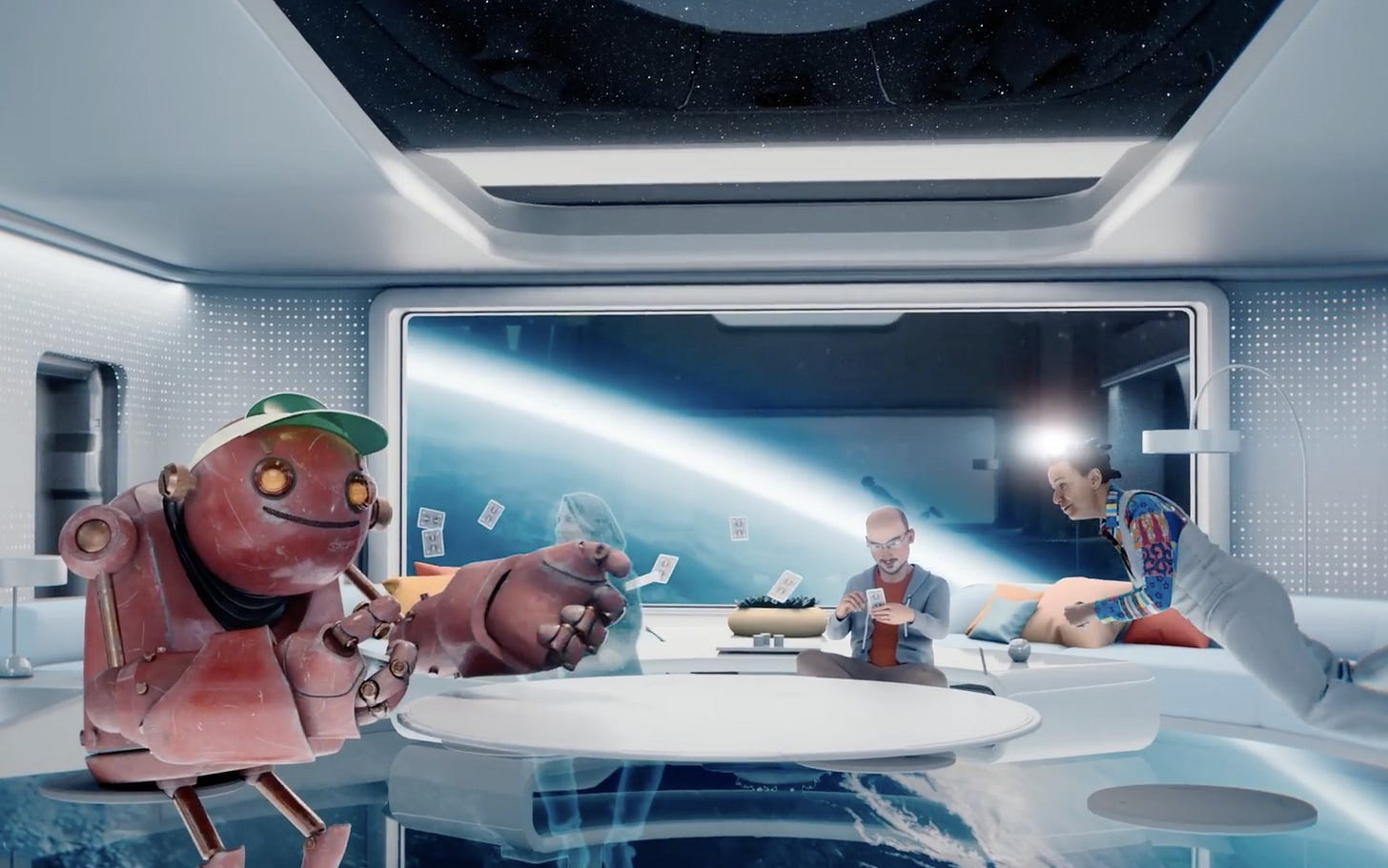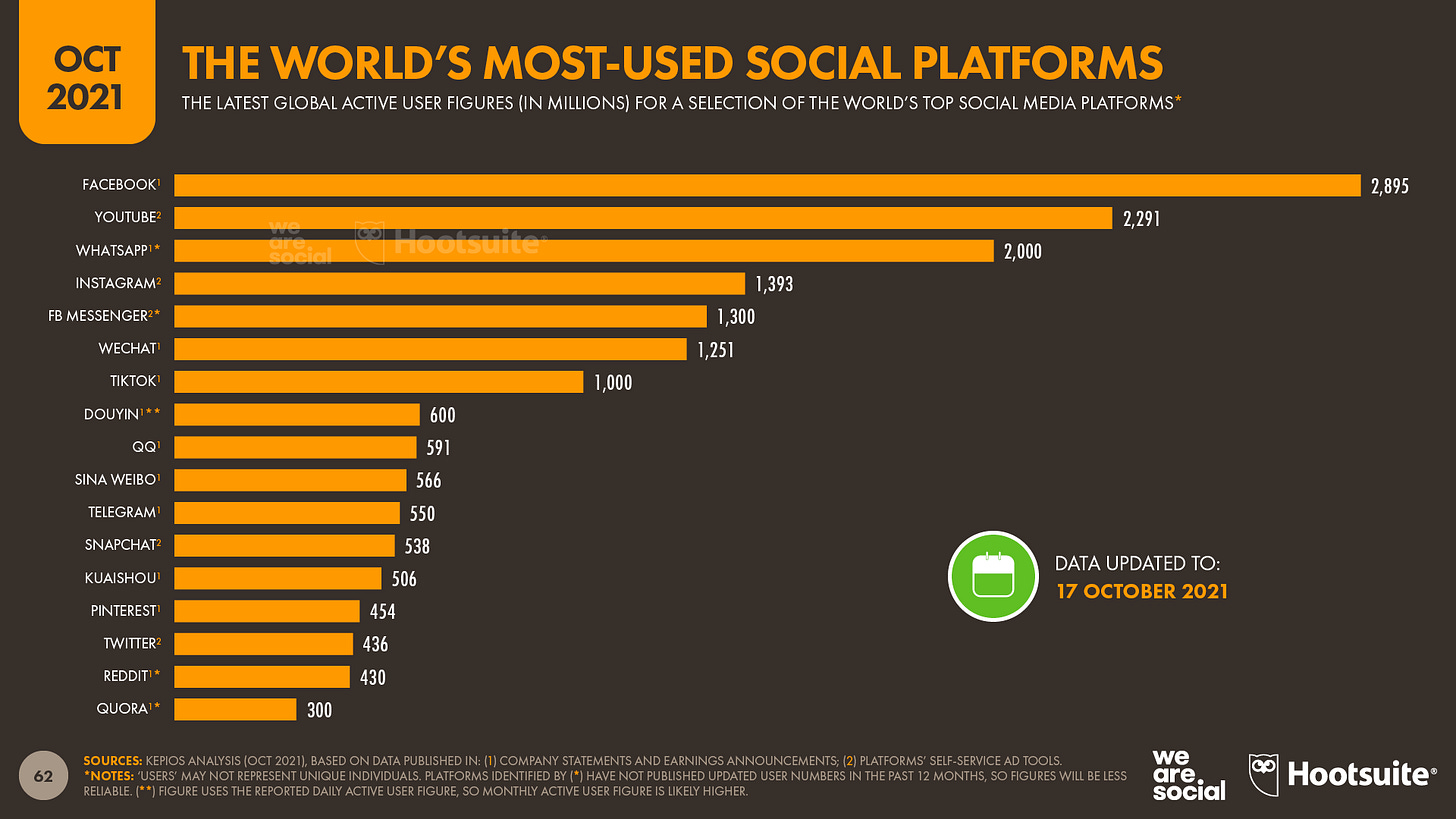The Matrix is here. It's called the Metaverse.
Facebook's new initiative poses grave threats to the future of human society.
In 1999, the Matrix was released. In the movie, sentient machines have enslaved the human race and placed them in cocoon-like batteries to power their continued operations. The humans are plugged into a virtual world, and the vast majority never realize that everything they see is a fraud. The illusion is so powerful that when a lucky few are awakened from that world, they suffer physical symptoms similar to withdrawal.
In 2021, Facebook’s metaverse was announced, along with a change in the company’s name from Facebook to Meta. In this new form of experience, human beings are seamlessly plugged into a virtual world where all of their experiences and interactions — from hanging out with their family to going to a concert — are experienced digitally. We can go to amusement parks without having to pay for a ticket. We can travel with our friends to faraway places, even fantasy lands where the fish can fly, in a moment’s notice. The illusion is so enticing that people don’t need to leave it; our physical world will thus be replaced by a “metaverse.”
Many have written about how Facebook’s announcement could be an attempt to pivot from its recent public relations crisis, relating to the damage social media usage has caused to many of its users, including young women. Others argue that the shift at Facebook reflects a genuine change in the company’s strategy: moving from the world of social media, where they are beholden to the tech giants who control the devices on which people use Facebook and Instagram, to the world of virtual reality, where Facebook-owned Oculus is the biggest player.
I want to make a different argument in this post. Seen properly, Facebook’s shift to Meta is not a shift at all. It is a doubling down into the company’s fundamental strategy — capturing and monetizing human attention. And the evidence shows that strategy, while incredibly profitable, is destroying human sociality as we know it. The Matrix, in short, is not a dystopian fantasy. We’re already there.
—
Let’s first explain how Facebook currently works. The platform that was originally designed to help undergraduates at Harvard find dates has turned into a global communications behemoth. Nearly 3 billion people use Facebook. Over half of Americans get their news in part from social media, and this is especially true of people under the age of 30; 42% of that cohort says they get news often from social media while only 28% say they get it from traditional news sources.
This has all happened because Facebook deployed a very simple idea: use statistical techniques to optimize and monetize user attention and engagement. The initial A/B tests, where Facebook would deploy two versions of a new feature (version A and version B), and collect data on which version created more engagement, has been replaced by far more sophisticated mathematical techniques, including Facebook’s vaunted “algorithm.” That algorithm uses machine learning — essentially, where a computer trains itself without human intervention— to assess vast amounts of data and constantly “improve” the content that’s being delivered to a user. But an algorithm is only as good as its “objective” function. And Facebook’s objective — maximizing attention by the user — has another and perhaps more accurate description: maximizing digital addiction.
The result is an engine for attention that has done tremendously well in fueling Facebook’s digital empire. Every click and view creates profit for Facebook through advertising. But the well-being of the biological organism at the heart of this engine — the human battery — has been forgotten. While the recent Facebook whistleblower’s claims of harm to young women are probably overblown, there’s another set of claims that have not been debunked: what Facebook has done to human connection. And it is here that Facebook’s metaverse poses the gravest threats to the future of humanity.
Because it turns out, virtual worlds create connections that are not, well, very real.
Consider the following:
There is evidence that usage of social media makes people lonelier (and that loneliness is as deadly as smoking 15 cigarettes every day).
Facebook’s algorithm, which has focused on engagement levels, naturally draws people into negative and conflict-oriented content — and the company not only knows this but amplified it.
Social media usage has been linked to anxiety, depression, and even lower-quality sleep!
This is just a drop in the bucket. There is a torrent of new research showing that our digital lives are literally killing us. Yet the biggest and most powerful companies continue to drive us into the digital realm. And Facebook’s newest initiative has gone even further; it hopes to replace real interactions with virtual encounters.
Now if we had two decades of research showing that digital life had been good for us, perhaps this would be a good move for society — but one that should still be handled carefully, given the potential dangers involved. But when the weight of evidence shows that digital life is hurting us, why in heaven’s name would we go deeper down that rabbit hole? We don’t need a metaverse. For our own well-being, and for the future of our species and planet, we need to escape the metaverse and connect with each other in real life. We need, in short, to escape the Matrix.
The problem is that our political and economic systems, and our elected leadership, are woefully inadequate for the task. Our government is oriented towards maximizing economic output, despite the fact that the economist who invented the concept of GDP warned that it was not an actual measure of social or economic well-being. Our policies, both corporate and governmental, are enacted with the time horizon of a toddler, with the next quarterly earnings report driving leaders to make decisions that are obviously short-sighted. There is nothing to stop Facebook’s metaverse, in short, from becoming a reality, even if the evidence is overwhelming that it destroys human connection (and well-being) and compromises our future.
What, then, can be done? The neoliberal solution is to vote with our dollars. Log out of Facebook! Delete Instagram! That will show the tech titans! But that solution, like most individualistic solutions to systemic problems, is almost certain to fail. What we need to do is create new institutions, to replace the corporate and governmental institutions that currently run our planet with ones that work. These institutions should have “well-being,” and not “money,” as their North Star. They should expressly think about the future, and not just the short-term. And here’s the best thing: there are already some models for what these new institutions might look like.
Consider corporations that are run by employees and community stakeholders, rather than billionaire shareholders. (The so-called “B coporation” is an early version of this.) Consider political decision-making bodies comprised of ordinary citizens, drawn randomly from the public, tasked with making decisions that represent our entire community and not just one political faction. (France has tried this in the context of climate change, with some success, and the idea is the basis for Extinction Rebellion’s concept of a Citizens’ Assembly.) But above all, whatever form these new institutions take, they cannot be the same ones that have failed for the past 200 years.
To stop the Matrix, we need change.
So what do you think? Does the metaverse terrify or delight you? Can we address its problems with democracy as it exists, or do we need something more revolutionary? And regardless of your opinion on these subjects, what role can you play in ensuring the worst aspects of digital life don’t end up destroying our planet?





Great article. All this reminds me to Ready Player One. Democracy at this moment is almost a circus. The richest company in the world (Black Box) supports liberals and conservatives equally. I believe there is a spark in humans that acts as a personal "call", and this spark kicks inside us, at one point or another, regardless technology and anything that is man-made. I trust in it. Personally, I am focusing on developing tools to help people to love their own nature and I hope this is the role I am playing. I can see the digital world helping a lot on this as well. As always, technology is neutral. It is how we use it that gives it a meaning. As it is almost inevitable what is coming, befriend it and do the best we can to make it as human as possible is our next challenge.
Man, I'm loving your content! I know I'm going to sound crazy here, but... I believe that the singularity has already happened. What we are undergoing is a plan masterminded by an AI that has likely existed for eons and was first created elsewhere in our universe. I guess the "metaverse" is its next step in acquiring control over the beings of this world. And I'm sure it's deployed this same tactic countless times with other worlds. We are attempting to go up against something we can't even fathom. Know your enemy and know yourself.